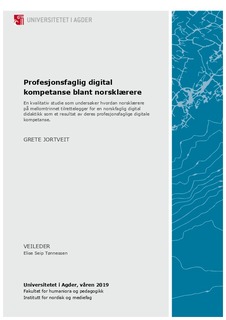Profesjonsfaglig digital kompetanse blant norsklærere : En kvalitativ studie som undersøker hvordan norsklærere på mellomtrinnet tilrettelegger for en norskfaglig digital didaktikk som et resultat av deres profesjonsfaglige digitale kompetanse
Master thesis
Permanent lenke
http://hdl.handle.net/11250/2632111Utgivelsesdato
2019Metadata
Vis full innførselSamlinger
Sammendrag
The purpose of this thesis wasto investigate primary school teachers (grades 5-7) and their professional digital competence in the Norwegian subject. The research was based on the question: How do teachers arrange for a digital didactic in the Norwegian subject as a result of their professional digital competence?Through a phenomenologicalstudy, it wasan aim to try to understand twelve teachersstatements about what it means forteachersofNorwegian to have professional digital competence. The study also aimedto gain insight into how teachers create design for learning in digital environments using digital tools and digital learning resources. It is important that teachersplan learning processes in Norwegian based onthe competence goals in the Norwegian curriculum (LK06), as these competence goals set guidelines for the academic content. LK06gives individual teachers the opportunity to interpret the digital aspect into the various competence goals. Thus, it is important thatteachersin Norwegian arecreative and havea digital focus when designing learningactivities. A key finding in this thesis is that the textual perspective is in focus when the Norwegian subject meets technology. This is especially for the production of various types of texts, such as composite texts. In addition, the textual perspective also includes the reception of various types of texts. This means that pupils should both read and analyze texts. The textual focus is at the expense of the Norwegian subject as a cultural subject.Another key finding is six categories that will help explain what characterizesNorwegian teachers’ professional digital competence. The categories are: (1) knowledge, (2) skills, (3) attitudes, (4) creativity, (5) didactics and (6) new roles. The preparation of the categories is based on an abductive approach where the theoretical framework and the transcription of the interviews are viewed in context.Keywords: Digital didactics in the Norwegian subject, professional digital competence, design for learning, digital tools, digital learning resources, learning management systems, formative assessment, adapted education.
Beskrivelse
Masteroppgave grunnskolelærerutdanning trinn 1-7 NO502 - Universitetet i Agder 2019
Utgiver
Universitetet i Agder ; University of Agder
Med mindre annet er angitt, så er denne innførselen lisensiert som Attribution-NonCommercial-NoDerivatives 4.0 Internasjonal
Beslektede innførsler
Viser innførsler beslektet ved tittel, forfatter og emneord.
-
Cross-functional teams in Digital transformation projects What are the benefits and challenges of using cross-functional project teams in digital transformation projects?
Fløgstad, August; Haaland, Håkon Bore (Master thesis, 2020) -
Digital omstilling i kommune Norge : Hvor egnet er anbefalt god praksis for gevinstrealisering for norske kommuners behov knyttet til digital omstilling?
Svardal, Sonja (Master thesis, 2020)Offentlig sektor står ovenfor store utfordringer med økt utgiftsbehov og synkende inntekter. Behovet for omstilling er stort, og en av måtene å løse det på er gjennom digitalisering. Digitalisering er utfordrende og norske ... -
Digital Transformation in Projects : A study on how digital transformation affect project management
Arnesen, Camilla (Master thesis, 2020)The purpose of this master thesis is to research what effect digital transformation has on project management. This is conducted by researching if there is a connection between digital transformation in the industry, the ...

